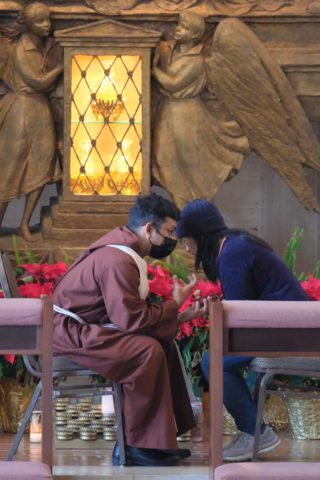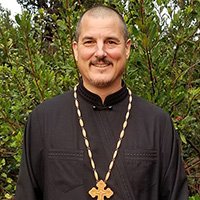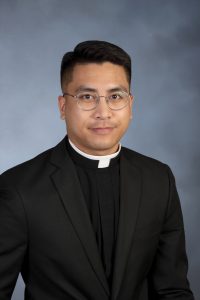An act of contrition (and grace)

What three confessors want you to know about the Sacrament of Reconciliation
By Christina Gray
In 2019, Catholic San Francisco, then in newspaper form, ran a feature story called, “Confessors on confession.” We asked four priests to share their personal perspectives on the Sacrament of Reconciliation. It was one of our most popular, most well-read stories that year.
It seems that Catholics, even lifelong Catholics, continue to seek a better understanding of and appreciation for the sacrament they first received when they were children.
This time we asked three priests representing three different generations and two different Catholic rites what they wanted to share with readers about confession as we prepare for Easter.
“Our Lord is absolutely forgiving. He wants to bring about who we really are, who He created us to be.”
– Father Bruno Gibson, O.P.
Dominican Father Bruno Gibson has heard a lot of confessions in his 64 years of priestly ministry. He’s heard them in parish confessionals, like most priests. But he’s also faced penitents in school hallways, outside on the steps of a church, and even in other spontaneous locations at St. Mary Magdalene Church in Bolinas, a historic mission church where until last year he traveled in semi-retirement from his home in Tiburon to preach or hold retreats.

Penitents have come to him “every which way you can imagine,” said the native San Franciscan, who turns 93 this year. “Sometimes someone will just turn to you.” He’s even had non-Catholics walk into his confessional out of some combination of curiosity and need.
After his ordination in 1960, Father Gibson served at Dominican parishes, universities and centers in Oregon, Washington and California. He was parochial vicar of another St. Mary Magdalene Church, this one in Berkeley.
“We often fail to realize that the Sacrament of Reconciliation is an encounter with the person of Our Lord Jesus Christ, just like the Eucharist is,” he said “He is encountering us, and we respond by saying yes, I am a sinner.”
Confession helps us accept and embrace the reality of our human lives, what is “real and true,” and not what is “illusory.”
Even Christians can think they are “this, that or the other thing,” Father Gibson said. “No one likes to think of themselves as a sinner.”
An examination of conscience and regular confession helps us confront the truth about our lives, and the actions we genuinely seek forgiveness for. Confession makes us whole again.
“Our Lord is absolutely forgiving,” said Father Gibson. He wants to bring about who we really are, who He created us to be.”
“Wouldn’t it be great to go back to the original day of your baptism in full purity and grace before God? Great, go to confession. That’s what confession is.”
— Father Sebastian Carnazzo
“One of the most important things for people to understand right off the bat, is that confession was understood in the early Church as something that happened only once in a lifetime,” said Father Sebastian Carnazzo, pastor of St. Elias the Prophet Melkite Church in San Martin.

The Melkite Byzantine Catholic Church is an Eastern Catholic church in full communion with the Holy See as part of the worldwide Catholic Church. Father Carnazzo, who was ordained in 2015, is also an adjunct professor of sacred Scripture and languages at St. Patrick’s Seminary & University in Menlo Park and prepares deacons.
In the early church, you hoped you’d never have to make a sacramental confession, he said, especially for a grievous sin, a mortal sin.
The Sacrament of Reconciliation was understood better then to be the restoration of our original baptismal grace.
“Wouldn’t it be great to go back to the original day of your baptism in full purity and grace before God?,” said Father Carnazzo. “Great, then go to confession. That’s what confession is.
“What people need to know is that history, and to understand the power of the sacrament that restores us to our original baptismal grace.”
Confession was done more frequently in both Western- and Eastern-rite churches as custom developed over time, but also, according to Father Carnazzo, because sin was more common.
“Christians today are less serious about living a pure life and walking in the footsteps of Christ every single day than they were in the early Church,” he said. We have become very worldly, and can find ourselves acting “of the world.”
Penitents often say they feel “lighter” after confession, said Father Carnazzo.
Perhaps that is partly guilt being lifted, he said, but what’s really happening is what he called an “Edenic” experience.
What we’re experiencing after confession is a “taste of Eden,” said Father Carnazzo, the restoration of our original relationship with God before the Fall.
“After confession, we can properly eat from the tree of life again and receive the Eucharist in a state of grace.”
“It is this sacrament that washes away the defects of one’s heart and makes the heart ready and well-disposed to receive its divine nourishment”
— Father Jerald Geronimo

Father Jerald Geronimo has been a priest less than two years, but as the parochial vicar at St. Mary’s Cathedral, the young priest has already heard many confessions.
Prayer is the best way to prepare for a good confession, he said. In silent prayer especially, human beings can converse with God and come to acknowledge the ways in which they have offended Him.
“And within prayerful preparation, the soul comes to realize the great mercy and healing love that awaits in the confessional,” he said.
Father Geronimo said it is important to remember that although they may kneel before a priest in a confessional, “they are really kneeling before Christ who is ever present in His minister.”
“It is Christ who they are confessing to,” he said, and he “already knows our sins. It is Christ who gives them counsel, and it is Christ who ultimately utters those sweet and beautiful words, ‘I absolve you from your sins.’”
In this period of Eucharistic Revival, Father Geronimo pointed to the connection between the Sacrament of Reconciliation and the Eucharist.
“The Most Sacred Heart of Jesus that is poured out for us in the confessional is the same Most Sacred Heart that is poured out for us in the Holy Eucharist,” he said.
“The way we conform our hearts to His is by going to confession,” Father Geronimo said. “It is this sacrament that washes away the defects of one’s heart and makes it ready to receive its divine nourishment in the body and blood of the Redeemer.”
Christina Gray is the lead writer for Catholic San Francisco.
*Father Bruno Gibson passed away on March 11, 2024. Catholic San Francisco is honored to have been one of the last interviews he did on such an important topic in the faith. May his soul rest in eternal peace.

